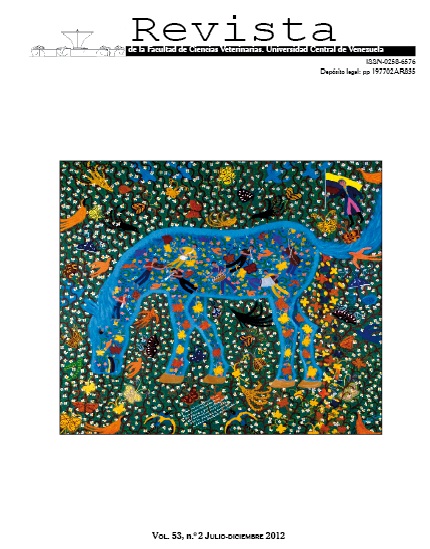ANÁLISIS MOLECULAR DEL GEN DE LA VP4 DE LA CEPA DE ROTAVIRUS BOVINO TIPO P[5] AISLADA DE BECERROS EN EL ESTADO YARACUY
Contenido principal del artículo
Resumen
La diarrea neonatal bovina indiferenciada es una enfermedad multifactorial que afecta a una alta proporción de becerros (50% o más) causando hasta un 40% de mortalidad en los primeros 30 d de vida. Entre los agentes causales se incluyen muchos enteropatógenos (bacterias, virus, protozoarios), con predominio de infecciones combinadas. Entre los virus, los rotavirus constituyen los principales agentes causales de gastroenteritis aguda en diferentes especies animales. Su genoma, de 11 segmentos de ARN de doble cadena, puede rearreglarse genéticamente en coinfecciones de diferentes cepas, produciendo una progenie viral con un nuevo fenotipo. En la ganadería bovina venezolana, se han descrito los rotavirus con una prevalencia de 20-30% en animales con cuadros de diarrea entre 2-6 sem de edad. Los serotipos G6 y el genotipo P1 se han reportado con mayor frecuencia en becerros de la región central de Venezuela. Cepas de rotavirus bovino del grupo A fueron detectados por inmunoensayo enzimático (ELISA) y electroforesis en gel de poliacrilamida (PAGE), en 32 de 280 (11,43%) muestras de heces de becerros de 15 fincas del estado Yaracuy, Venezuela. La secuencia nucleotídica se logró para una de las variantes detectadas (A610). En el análisis comparativo de las secuencias de la VP8* (fragmento de la VP4) mostró corresponder al genotipo P[5]. Estos datos constituyen el primer reporte de una cepa de rotavirus bovino genotipo P[5], que circula en las fincas del estado Yaracuy, Venezuela, pudiendo servir de apoyo para la incorporación de este grupo viral en las vacunas que se utilizan en el país.
(Palabras clave: Análisis, genotipos, proteínas, diarrea, rotavirus bovino, técnicas, VP4, Yaracuy)
Abstract
The undifferentiated neonatal bovine diarrhea is a multifactorial disease that affects a high proportion of calves (50% or more) causing up to 40% of mortality in the first 30 d of life. Among the infectious agents known to cause diarrhea in calves are the rotavirus and coronavirus. Rotaviruses are the major causative agents of acute gastroenteritis in different animal species. Their 11-segment genome of double ARN chain can genetically re-arrange different strains, producing a viral progeny with new or atypical phenotype. Rotaviruses have been described in the bovine Venezuelan cattle, with a prevalence of 20-30% in animals between 2-6 weeks of age, with episodes of diarrhea. The serotypes G6 and the genotype P1 have been reported with higher frequency in calves from the central region of Venezuela. In this investigation, rotavirus strains of cattle from Group A were detected by the enzyme-linked immunosorbent assay (ELISA) and the polyacrylamide gel electrophoresis (PAGE) in 32 of 280 (11.43%) stool samples of calves in 15 farms in the State of Yaracuy, Venezuela. The nucleotide sequence was obtained for one of the variants detected (A610) and the comparative analysis of the sequences of the VP8* (the VP4 fragment) corresponded to the P [5] genotype. These data constitute the first report of a strain of bovine rotavirus genotype P[5], which circulates in the States of Yaracuy, Venezuela, and can serve as a support for the inclusion of this viral group to the vaccines that are being used in the country.
(Key words: Analysis, genotypes, proteins, diarrhea, bovine rotavirus, techniques, VP4 Yaracuy)

